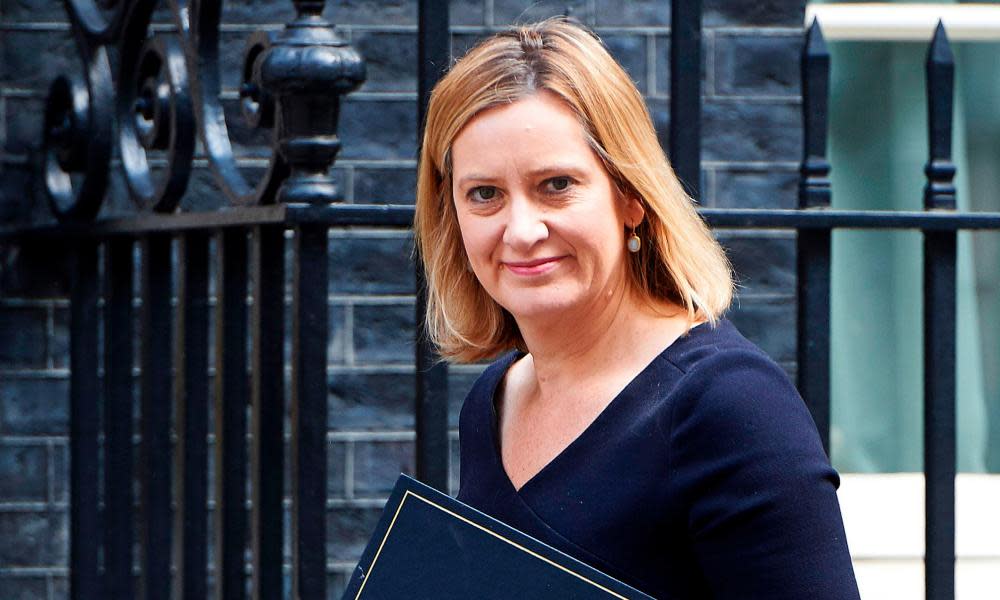Rudd enters row on NHS charging women from Northern Ireland for abortions

Women from Northern Ireland must have access to terminations in England, the home secretary, Amber Rudd, has said as pressure mounted from Tory backbenchers for the government to reconsider its policy of charging the women for NHS abortions.
About a dozen Conservative MPs are understood to have expressed concerns about the situation in light of their party’s confidence and supply arrangement with the anti-abortion DUP.
Northern Ireland has some of the most restrictive abortion laws in Europe and UK government policy states women travelling to England for terminations must pay for the NHS procedures despite being UK taxpayers, a policy upheld by a supreme court case earlier this month.
In the House of Commons, MPs raised concerns with the first secretary of state, Damian Green, that the government may have a tacit understanding with the DUP not to change the law in England.
But the Guardian understands DUP MPs are unhappy at this suggestion and have not appreciated being subtly painted as an obstacle to the policy change.
In a pointed intervention on Wednesday during a speech by the Labour MP Stella Creasy in the Queen’s speech debate, DUP MP Ian Paisley Jr said: “I do respect her genuine interest in this subject, I think it is important the house recognises this is not a matter for Belfast, this is a matter for NHS England.”
Rudd’s response, meanwhile, was prompted by a question during the debate from Tory MP Anna Soubry, who said there was “much concern on both sides of the house about the situation pertaining to women who live in Northern Ireland who seek terminations.”
Soubry asked the home secretary to give her assurance that access to termination would not be restricted while the situation was “resolved”, though there is no indication the Department of Health is preparing to change the policy.
Rudd said Soubry was “absolutely right … We are absolutely committed to healthcare for women, and that includes access to terminations.”
The controversy has unfolded before an important judgment on Northern Ireland’s abortion law. A court in Belfast is expected to rule on Thursday whether the region’s laws are in breach of the human rights of women and girls.
The court will determine whether two high court rulings in 2015 and 2016 that the existing abortion regime in Northern Ireland breached a woman’s right to a private life under European law can be upheld.
These were in cases involving women and girls who could not obtain abortions in local hospitals in cases of fatal foetal abnormality or became pregnant as a result of sexual crimes.
More than 50 MPs from all the major parties have signed an amendment to the Queen’s speech coordinated by Creasy, which the Speaker is expected to consider for a vote on Thursday, though there is no guarantee it will be chosen.
Three Tory MPs have also signed a letter to the health secretary, Jeremy Hunt, calling on him to end the charges. They are former cabinet minister Nicky Morgan, Dan Poulter and Sir Peter Bottomley, who also signed Creasy’s amendment. Hunt has historically favoured tighter restrictions on abortions, suggesting the legal time limit be halved from 24 to 12 weeks.
The letter, coordinated by sexual health charity FPA, says: “As MPs, peers and members of the legislative assembly in Northern Ireland, we are dedicated to campaigning for a change to this unfair an discriminatory law.
“However, while our advocacy in this area continues, we would like to highlight the court’s ruling which states that, as secretary of state, you hold the legal authority to change your policy on funding abortion services in England for women normally resident in Northern Ireland. We urge you to use this authority and reduce the significant financial burden women travelling from Northern Ireland face.”
The letter to Hunt is also signed by the British Pregnancy Advisory Service, the Royal College of Midwives and the Royal College of Obstetricians and Gynaecologists, as well as the Fawcett Society and Amnesty International.
At least three other Tory MPs are known to have made private representations to Hunt or Conservative whips on the issue. One Conservative MP, who has not publicly voiced their concerns, told the Guardian: “Many of us simply did not know about this before, it didn’t occur to me. Taking this to court will be more expensive than NHS England paying for it.
“I know at least half a dozen colleagues who are concerned. None of us are going to vote for amendments to the Queen’s speech for very obvious reasons, but quite a lot are saying to the whips, this is weird, it’s not something we should get into a fight over.”
Creasy said the government needed to be open about what the obstacle was to the change.
“With voices on all sides backing the rights of Northern Irish women to be able to have an abortion in England on the NHS, the government now needs to come clean on just who is stopping them from ensuring these women can use these vital healthcare services in England and Wales and whether the question of abortion access has been discussed as part of their agreement with the DUP,” she said.

 Yahoo News
Yahoo News 
